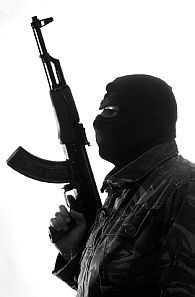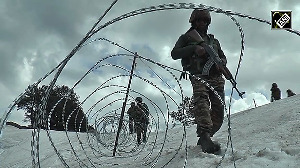 Even without the ISI, ISIS and Al Qaeda, Tamil Nadu, otherwise acknowledged as a progressive and developed state in the Indian context, has been at the centre of ‘multiple militancy’ for decades now, points out N Sathiya Moorthy.
Even without the ISI, ISIS and Al Qaeda, Tamil Nadu, otherwise acknowledged as a progressive and developed state in the Indian context, has been at the centre of ‘multiple militancy’ for decades now, points out N Sathiya Moorthy.
The recent arrest of Sri Lankan Tamil national Arun Selvarajan by the National Intelligence Agency in Chennai may have exposed the sheer audaciousness – or, utter stupidity -- of Pakistani ISI operations in southern India.
A third, theoretical possibility is that the ‘ISI recruits’ may be running amuck, independent of their ‘handlers’, who may have been withdrawn since. If so, the question is: Why, how and for whom are they still working?
Such questions are not without reason.
Arun was arrested two full two years to the month after the Intelligence Bureau had nabbed an Indian national, Thameem Ansari, on his way to Tiruchi airport to board a flight, for meeting up with his ISI handler operating out of the Pakistani embassy in Colombo.
In between, Indian security agencies had arrested Sakir Hussain, a Tamil-speaking Muslim from Sri Lanka. On the information provided by him, the Malaysian authorities arrested Mohammed Sulaiman, and two others, all three Sri Lankans.
From Ansari to Arun, all those arrested have spoken about the ISI’s plans to target strategic installations in Tamil Nadu, and/or US and Israeli diplomatic missions in Chennai/Bengaluru.
All of them, including the latest catch, have also pointed to Colombo-based Pakistani diplomat Amir Zuhair Siddiqui, who in between had moved back home, reportedly “after completing his term”.
That Hussain, Sulaiman and now Arun have continued with their activities even after Ansari’s publicised admission to working for the ISI at Siddiqui’s instance would show that either the tail was wagging the dog, or the ISI had felt compelled to focus greater ‘attention’ on south India.
Reports that the NIA team probing the current cases could be visiting Sri Lanka, it is hoped, would help put things in perspective. Despite full information provided by those arrested in India, sections of the Sri Lankan establishment seems to be on a ‘denial mode’, vide ISI using Colombo and SL officials making the connection.
It’s as much critical for Sri Lanka as for India. The nation is troubled even otherwise by apprehensions of LTTE revival in some form. It’s also worried about possible ‘international network’ of jihadists targeting the island-nation, either as a base or otherwise, with the Sinhala chauvinist Bodu Bala Sena adding an additional angle.
Even without the ISI, the recent Al-Qaeda threat to open a ‘branch’ in India and the parallel Syrian-Iraqi ISIS’ ability to attract youth from these parts should be an eye-opener for the security agencies in the two nations, and also to those in south Indian States like Tamil Nadu.
Gone wholly are the days when south Indian States, particularly Tamil Nadu, could pride themselves about the improbability of terrorist threats. The perception was not wholly right, either. The threat now is more real than ever. Apprehensions, though not assessments, of their impact too are graver than ever.
Even without the ISI, ISIS and Al Qaeda, Tamil Nadu, otherwise acknowledged as a progressive and developed State in the Indian context, has been at the centre of ‘multiple militancy’ for decades now.
Protests sympathising with Sri Lankan Tamils, the support on the Koodankulam issue, apart from other pan-Tamil causes may have together contributed to an air of permissiveness in Tamil Nadu, which various militant groups and overseas outfits like the ISI may want to exploit.
Support for all such causes from the government and the polity of the day may not have helped matters. In this, the so-called national parties, including the State unit of the ruling BJP at the Centre, have not fared any differently.
Apart from the NIA, the CBI has since sought Arun’s custody for interrogation on possible linkages to the LTTE, and his knowledge, if any, about the Rajiv Gandhi assassination. The latter could be hearsay at best. Going by his age-profile, Arun would have been only five years when the assassination took place in 1991.
Yet, any LTTE linkage, if proved, would have consequences for the two nations. It could mean that either the LTTE had now begun working with the ISI, purportedly against India, but possibly against Sri Lanka even more. Colombo would have its hands full more than India, given that the LTTE may have sought to use the ISI as much as the other way round.
It is in this context, former DMK Chief Minister M Karunanidhi’s demand for naming the politician reportedly involved with Arun Selvarajan may have some significance – until proved otherwise.
N Sathiya Moorthy, veteran journalist and political analyst, is the Director of Observer Research Foundation, Chennai Chapter.










 © 2025
© 2025